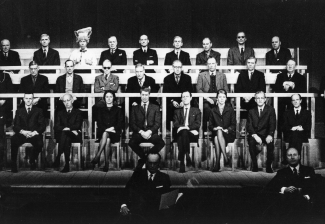The Investigation
Bergman staged Peter Weiss' play, based on the trials in Frankfurt between 1963-65 of 18 Auschwitz functionaries, just months after the premiere in West Berlin.

'Of everything I have seen in theatre, nothing has shaken me as much as this performance.'Bengt Jahnsson, Dagens Nyheter
About the production
As was the case with Tiny Alice, Bergman took over this production from ailing Bengt Ekerot. A live radio broadcast from The Royal Dramatic Theatre was also aired.
The play caused considerable debate when it was produced on several stages in Europe.
Bergman's interest in the play was more existential: he had the stage designer Gunilla Palmstierna-Weiss construct a wooden wall behind the performers that provided no exit.
Peter Weiss recommended that the lights should be left on in the house during the entire performance. Bergman followed the instructions - the lights were only turned off when the trial/performance ended, leaving the audience seated in total darkness. The effect of the contrast between stage and auditorium, though, remained small, while Bergman chose to put extra light on the stage.
Sources
- The Ingmar Bergman Archives.
- Henrik Sjögren, Ingmar Bergman på teatern, (Stockholm: Almqvist och Wiksell, 1968).
- Birgitta Steene, Ingmar Bergman: A Reference Guide (Amsterdam University Press, 2005).
- Birgitta Steene, Ingmar Bergman: A Reference Guide, (Amsterdam University Press, 2005).
Many critics were shaken by the performance. One of them, Håkan Tollet in Hufvudstadsbladet, wrote, 'The audience sits breathless. Here a terrible reality opens up. For the most part it is nothing new, but it comes so very close.' Another reviewer simply wrote, 'Go to The Royal Dramatic Theatre. There they are performing the most important play there is.'
Collaborators
- Hans Strååt, The judge
- Gösta Prüzelius, Prosecutor
- Olle Hilding, Counsel for the defence
- Erland Josephson, Mulka
- Sigge Fürst, Boger
- Alf Östlund, Capesius
- Ragnar Arvedson, Frank
- Hans Sundberg, Schatz
- Olle Ek, Lucas
- Ulf Johanson, Kaduk
- Helge Hagerman, Hofmann
- Bengt Eklund, Klehr
- Per-Olof Ekvall, Scherpe
- Birger Malmsten, Hantl
- Per Myrberg, Stark
- Oscar Ljung, Baretzki
- Kotti Chave, Schlage
- Henrik Schildt, Bischof
- Rudolf Wendbladh, Broad
- Axel Düberg, Breitwieser
- Gösta Krantz, Bednarek
- Ingvar Kjellson, Witness
- Georg Årlin, Witness
- Olof Widgren, Witness
- Anita Björk, Witness
- Barbro Larsson, Witness
- Tord Stål, Witness
- Anders Ek, Witness
- Jan-Olof Strandberg, Witness
- Ragnar Falck, Witness
- Beata Bergström, Stills photographer
- Peter Weiss, Author
- Lennart Andersson, Stage manager
- Arne Lundh, Make-up and wigs
- Walter Techt, Make-up and wigs
- Ingmar Bergman, Director
- Gunilla Palmstierna-Weiss, Designer
- Elisabeth Leijonmarck, Prompter
- Britt G. Hallqvist, Translation